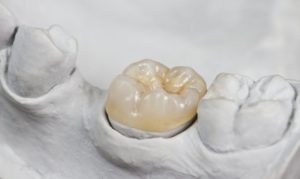 When your crown is damaged, the rest of your tooth is vulnerable to being infiltrated by bacteria that can cause infection and a host of other problems. To prevent that from happening, your local dentist offers dental crowns in Millersville to do the job. But once your tooth is fully restored, how can you protect it to ensure the most longevity. Find out as you read on!
When your crown is damaged, the rest of your tooth is vulnerable to being infiltrated by bacteria that can cause infection and a host of other problems. To prevent that from happening, your local dentist offers dental crowns in Millersville to do the job. But once your tooth is fully restored, how can you protect it to ensure the most longevity. Find out as you read on!
What is a Crown?
Before we jump into how to protect a crown, let’s be clear on what it consists of and how it functions. A replacement crown will typically be made from tooth-colored ceramic that fits right over the existing tooth and is sealed using a special type of cement.
The process, which includes X-ray photos and bite impressions being taken to send to a trusted lab, is usually completed in two-to-three visits, concluding with your dentist placing your permanent fixture. Once you’re fully restored, how do you protect your new smile?
Making Your Crown Last
There are several simple steps that you can take to increase the longevity of your dental crown, which include the following:
- Oral Hygiene – Your crown restoration isn’t subject to tooth decay, so why does oral hygiene matter? It’s still important because it affects more than just your teeth; it also impacts your gum health. Brushing and flossing twice daily will remove harmful bacteria that could cause infection and compromise your new crown.
- Preventing Bruxism – Another way to maintain your crown is to abstain from grinding your teeth. It puts a lot of pressure on your them and wears down the enamel. Furthermore, it can cause your crown to unseat. If you have this problem, then you should reach out to your dentist for help immediately.
- Regular Dental Visits – Visiting your dentist after you’ve had a new crown replaced is beneficial for a few reasons. It will allow him or her to keep an eye on the progress of your new fixture and to also clean and examine your mouth. This is the ultimate in proactive action, as it will ensure that your restoration lasts longer, and you’ll enjoy better oral health.
How to Get Crowned
If you suspect that you have crown damage, then it’s important to reach out to your dentist to be seen. That’s because problems like tooth decay neither stop nor slow down. So if you want to save your tooth and ensure that there’s enough material left to still be treated, then reach out to your dentist in Millersville to schedule a visit today!
About the Author
Dr. Charlie Ward earned his DDS degree from the University of Maryland Baltimore College of Dental Surgery. Additionally, he has received advanced training from the Pankey Institute, which has helped to further expand his knowledge and skillset. Dr. Ward provides his patients with the absolute best care at Conklin & Ward Dental Group and can be reached for more information through his website

